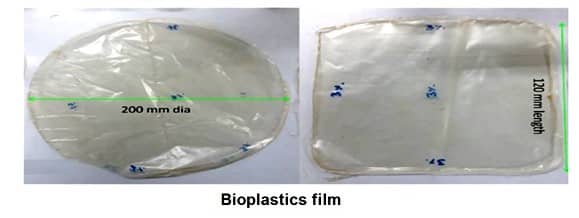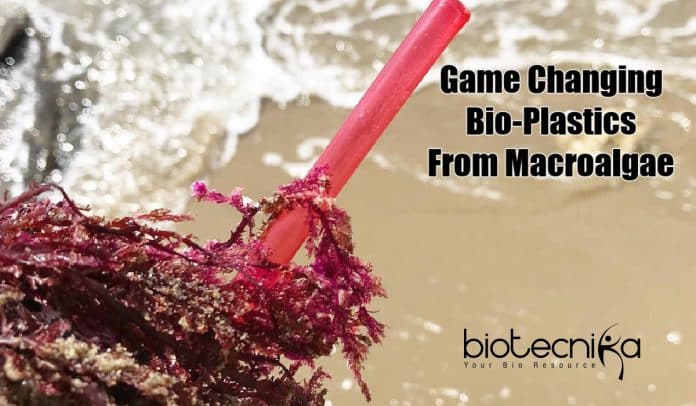Scientists From NIOT Develops Seaweed-Based Bioplastics
A breakthrough in the plastic industry has been made by NIOT (National Institue of Ocean Technology) by developing a bio-plastic film from macroalgae & PEG-3000. This innovation will potentially scale down the consumption of plastics that are non-biodegradable. These bioplastic films disintegrate in the environment safely without any traces of toxins. Both the mechanical & physical properties of bioplastic film exhibit a matching level with the properties of synthetic plastics.
Synthetic plastics have become a persisting conundrum in the environment. In addition to this, these polymers interact with water and form toxic chemicals that are consequently discharged to the surroundings, jeopardizing life on Earth. Synthetic polymers take ages to break down. Many plant-based bioplastics (sugarcane & corn starch) are available in the market as renewable and eco-friendly. These are similar to the algae-based bioplastics. In an effort to determine a feasible substitute without disturbing the terrestrial crops utilized for anthropogenic needs, researchers have steered their studies on marine biomass for the production of biodegradable plastics in a sustainable manner leaving the feedstock biomass unhampered.

In a crowded nation like India, several kinds of dangerous plastics are utilized
rampantly because of the soaring demands for packaging of several foods and consumer products. Scientists from NIOT have successfully found a solution to this. They have devised and assessed bioplastic films by using eco-friendly methodologies with seaweed. One of the viable options they found is the usage of renewable seaweed.Red algae (Kappaphycus alvarezii) is a macroalga proven to be a significant commercial source of many commodities and carrageenan that have extensive industrial uses. These algae are extremely colloidal and can be easily and cheaply cultivated in a short period of time (about 45 days) with sunlight alone and no chemicals or freshwater. Despite this, they are a potential source of polymers like the polymers from land-based plants that are utilized to produce carry bags and food packaging materials which enables permeability of moisture and oxygen. Since the permeability of moisture and oxygen are two crucial facets for packaging materials of fresh produce in order to prolong their shelf-life, NIOT researchers propose that red algae might be our knight in shining armor for environmental crises related to toxic plastics.

NIOT researchers used this red seaweed which was grown in the Gulf of Mannar area for the development of bioplastic films along with the plasticizer PEG-3000 (Polyethylene Glycol) to attain enhanced tensile strength. Polyethylene glycol is an eco-friendly & non-toxic polymer, majorly utilized to boost the thermos-plasticity of polymers largely employed in medicinal sectors to manufacture dispersing agents and creams that are utilized in therapeutic products.
The present study results from NIOT proved that bioplastic polymers can be naturally degraded in a short timeframe with no traces of toxic by-products. These bioplastic films can also be discarded similarly to normal food waste disposal methods. The research implies that large-scale production of seaweed bioplastics could be a turning point for the future.
The research was supervised by Dr. Gopal Dharani, Mr. Dhassiah Magesh Peter, and Dr. Muthiyal Prabakaran Sudhakar from Ocean Science & Technology for Islands Group, Marine Biotechnology Department, NIOT, Ministry of Earth Science, Government of India, Chennai. The study findings were recently issued in Environmental Science & Pollution Research journal.
NIOT Develops Bioplastics From Seaweed

































Bioplastic is very important for control on global warming. The microbe is very helpful to make various biological product.